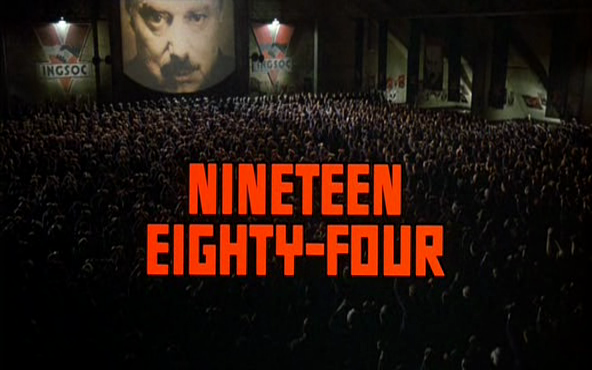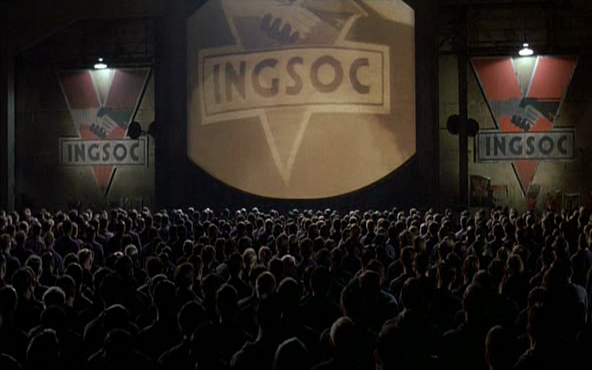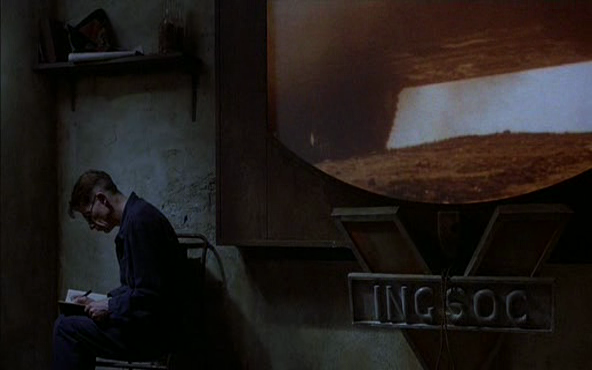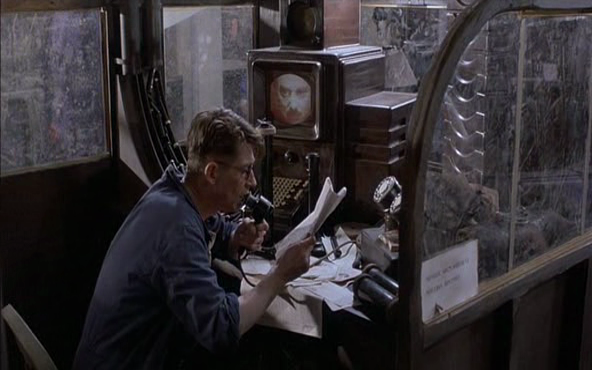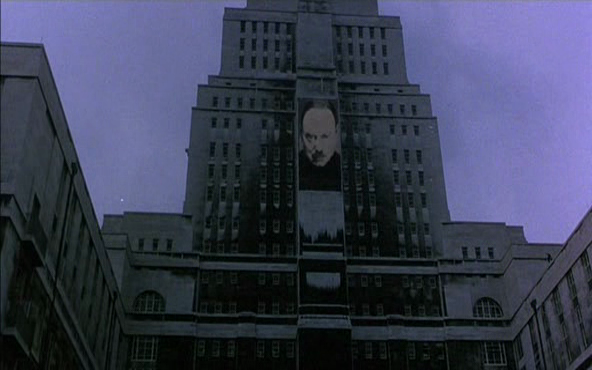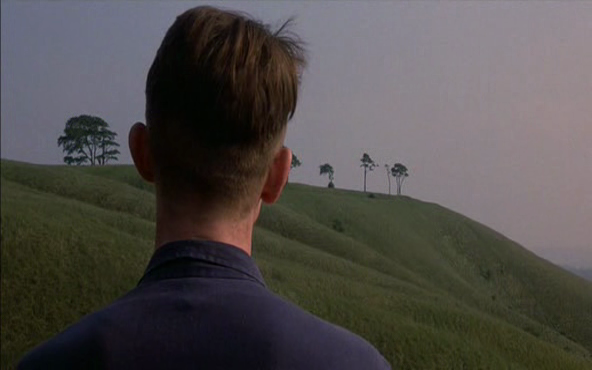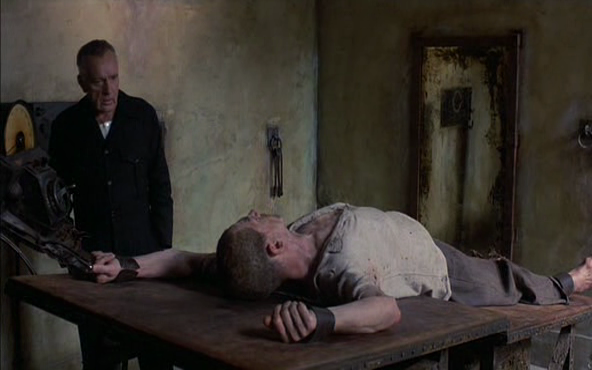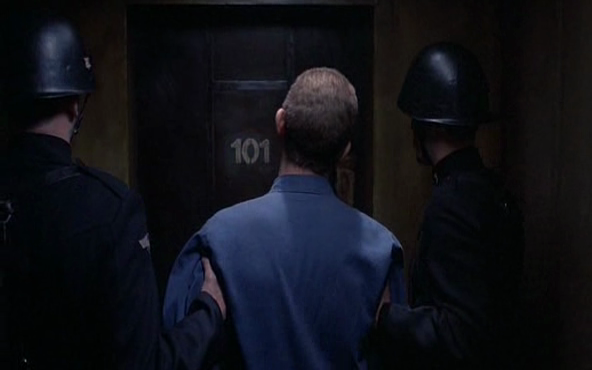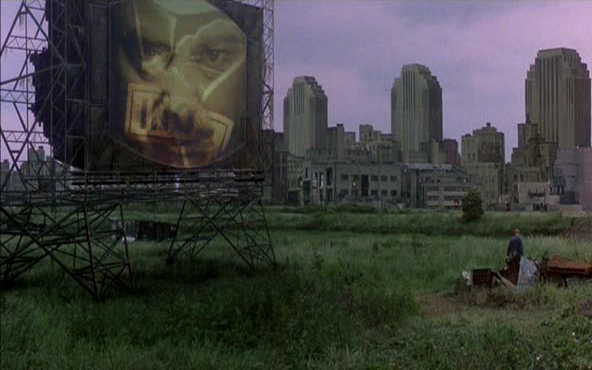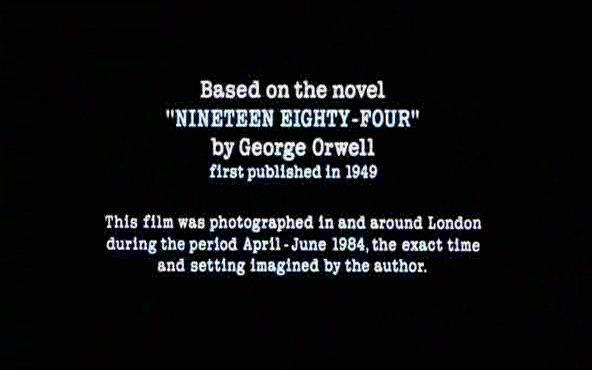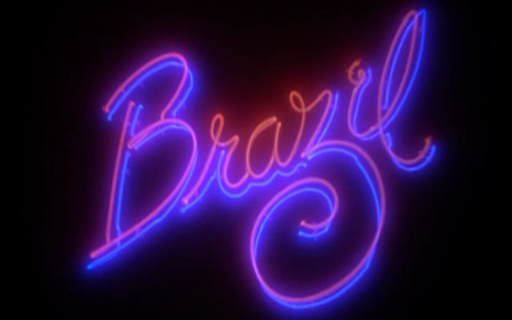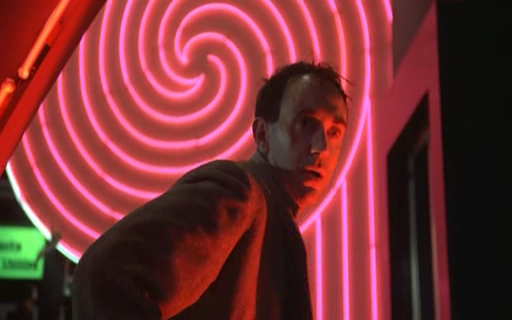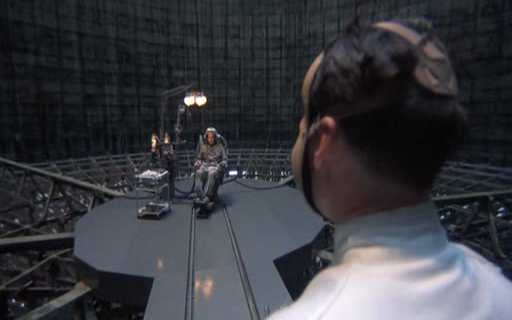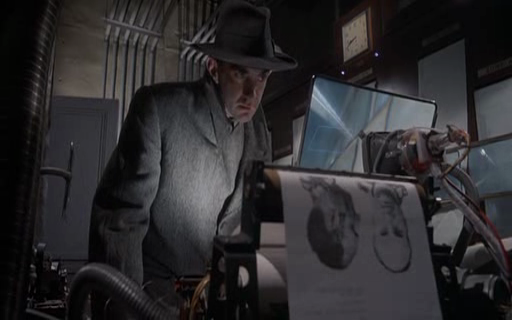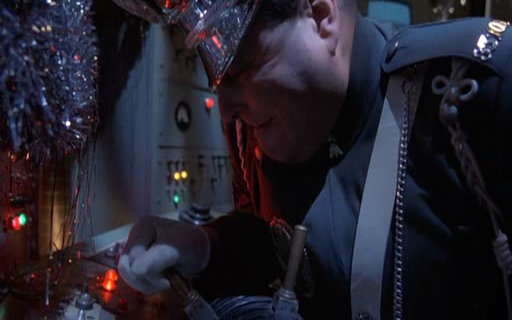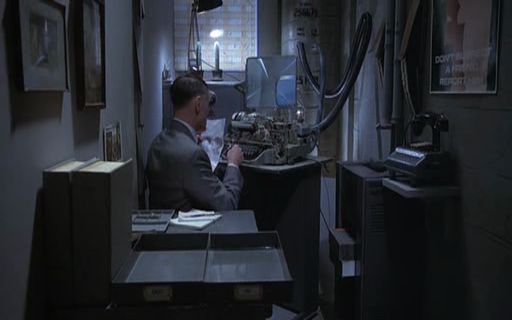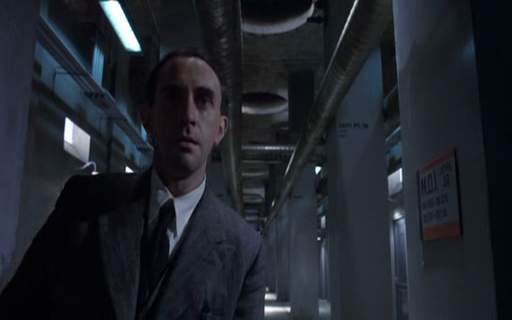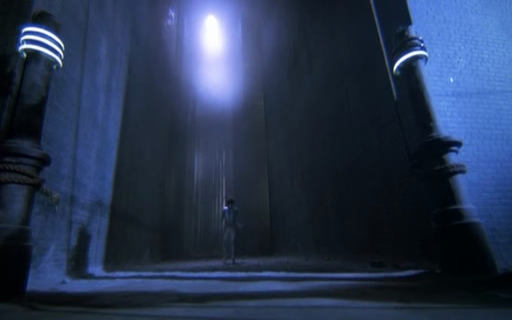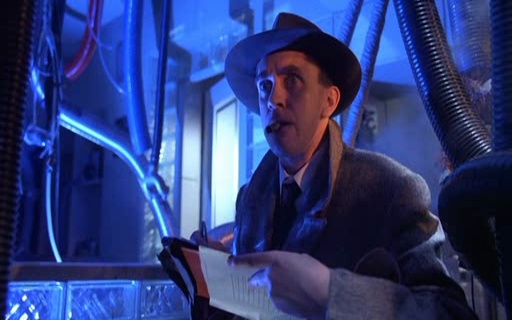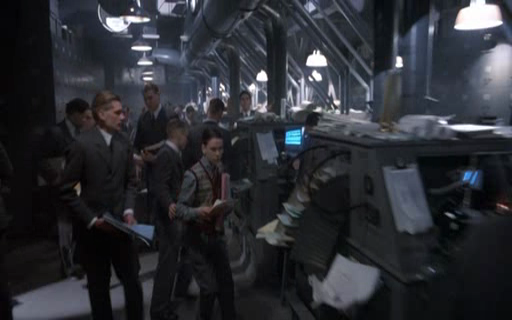-
#17 – Nineteen Eighty-Four (1984)
Nineteen Eighty-Four (1984)
Film review #17
Director: Michael Radford
A 1984 movie adaption of the famous George Orwell novel 1984 where The Party is everything and all powerful.
In a dystopian 1984, Winston Smith lives in a squalid existence in the ruined state of Oceania. His job is at the Ministry of Truth is to re-write history in accordance with the current political situation. He is haunted by memories of his childhood when his Mother and Sister disappeared. He also keeps a journal of his private thoughts, which is a thoughtcrime, breaking the law of no independent thought.
One day, Winston meets a woman named Julia, and begins an affair with her. (It is against the law for people to fall in love), they live a secret life in an illegal apartment, and drink and eat various forbidden foods such as real coffee and real bread, whereas the workers usually get standard rations to live on, which helps support the parties war effort.
The couple’s (somewhat) blissful existence comes to an end when the two are arrested by the Thought Police. It turns out that the man from whom they were renting the room from is a member of the ruling party. After a lengthy interrogation, Winston learns the truth: That the enemy of the state; Emmanuel Goldstein, does not exist and was invented by the party (The same is seemingly held true for Big Brother). His interrogation continues into Room 101, where he is confronted by his worst fear: Rats. Upon betraying Julia, insisting they inflict the pain on her, is deemed cured, and fit to be released.
In the final scene, Winston is sitting in the Chestnut Tree Café, where he had seen previously rehabilitated criminals. He meets Julia, who informs him of how she betrayed him. Clearly having lost any affection for each other, she leaves, and Winston is left with the glaring image of Big Brother in the café…
There have been a number of adaptations of 1984, into TV series, movies and radio dramas. This particular movie is of particular interest because it was produced in 1984, the year the novel was set. Obviously, when the novel was written in the late 40’s it was a look at the future, but when the movie was made, it was present day…yet it isn’t, because the 1984 it was produced in wasn’t much like the version in the movie. This brings up an interesting comparison between the one imagined by Orwell in 1949, and the actual one. It was however, shot in and around London, where the novel takes place, in the same year and months that the novel takes place.
We perhaps can be thankful that 1984 did not turn out the way that Orwell imagined, which is depicted as a run-down city with no maintenance, and the population live in squaller. Writing after the end of World War II, after the bombing and destruction of Britain’s cities, it was probably difficult to imagine a future rising from the ashes of the war. Another interesting footnote in the development of the movie is that Orwell’s widow, Sonia Brownell only gave permission for the film to be adapted shortly before her death, under the condition that no “futuristic special effects” were used in making the film. This decision perhaps adds to the relevancy of the film, making as “present day” as possible, while still keeping the real and imagined apart.
There is a sense of psychological terror in 1984 that is used to address society that isn’t really seen quite as strongly in other science-fiction works, though it still fits in with the British views of science-fiction. The film takes the concepts of invasion and governmental control to the last bastion of humanity: The inner-most thoughts of the mind. it is a dark and terrifying prospect that is raised, that people will yield control of their lives to the government under the blanket of fear of war and invasion.
Overall, it is a positively received adaption of the book, in comparison to the 1956 US movie (Which gave the story a happier ending, but hasn’t been released since). The franchise has become a mainstay of science-fiction and British culture, with concepts such as “Big Brother”, “newspeak” and “thought police” being popularised by the novel. It also has influenced other films, such as Brazil in 1985, which deals with very similar themes but with a more black humour, or V for Vendetta. So, if you enjoyed 1984 the novel, this adaptation shouldn’t disappoint.
-
#16 – Brazil (1985)
Brazil (1985)
Film review #16
Director: Terry Gilliam
A science-fiction film where information is king…
In an unidentified country, a man named Sam Lowry often find himself dreaming about saving a beautiful woman. In reality however, he is a low-level government employee at the ministry of records. Information and paperwork rules society here, and mistakes are unheard of. However, Sam is given the task of rectifying a mistake that caused Archibald Buttle instead of Archibald Tuttle to be arrested and (accidentally) killed.
Sam goes to deliver a reimbursement cheque to the widowed Mrs Buttle, since any cost of arrest and detainment are met by the perpetrator. She is however, stricken with grief, and refuses to fill out the paperwork. Sam then sees the woman living upstairs and recognises her as the woman from his dreams, he gives chase and loses her, but learns her name: Jill Lawton. However, he cannot access her records because she is considered a suspect for trying to report the mistake of Buttle’s arrest to a government that does not admit to making mistakes. When he returns home, he meets the real Tuttle, who helps to fix his air conditioning when it fails and Central Services (the company that handles all the repairs) is short-staffed. Tuttle is a renegade repairman who fixes things without the assistance of Central Services, which is highly illegal.
Sam figures the only way to get access to Jill’s records and her location is to accept his Mother’s help to get promoted to the Ministry of information retrieval. He goes to see her while she is in the midst of more plastic surgery. When he arrives at his new office at the ministry, he retrieves the records and tracks her down before she is arrested, after declaring he is in love with her, he erases her records to classify her as deceased. After sharing a romantic night with her, Sam is arrested.
Sam is tied to a chair ready for interrogation for misusing his government position. His old friend Jack is carrying out the interrogation, where he tells Sam Jill was killed resisting arrest. Suddenly, Tuttle and the resistance rappel in from the roof and free him. They break out of the ministry and go on the run, where Tuttle seems to disappear in a flurry of paperwork. Sam then stumbles upon the funeral of his Mother’s friend who has died from excessive plastic surgery. Sam’s mother now looks younger than him thanks to the plastic surgery, and Sam escapes in horror, and is rescued by Jill in her truck, and the two drive off into the sunset. This happy ending turns out to be short-lived however, when the scene cuts back to the interrogation room, where Sam has gone catatonic from the interrogation, and the film ends with him humming “Brazil” as Jack and the information minister exit the room…
Brazil is a very British film, featuring an almost entirely British cast. The ministries and locations are reminiscent of something you would find in Britain rather than the US for example. The humour lends itself to become a black comedy, similar to other British films such as Monty Python or Time Bandits (Also produced by Terry Gilliam). This comedic element is a very fresh take on the science-fiction genre, since the two are rarely combined. The dystopic nature of the film too is also a different take on future society which is favoured by Britain over the utopian views of the US, as shown by British TV shows such as Doctor Who.
The direction and design are reminiscent of other films and future views. For example, the retro-fitted design of the city filled with neon lighting and tightly packed rooms filled with electronics is similar to Blade Runner, while the concept of government being flawless and all knowledgeable is similar to George Orwell’s 1984. It should be noted that While Blade Runner was meant to represent a near future (2020), Brazil is very much a reflection on the (then) present day government. In this respect, it relates to how 1984 was written about a futuristic 1984, but Gilliam notes it is a “Nineteen-Eighty Four for 1984”, seemingly eager to emphasise its relevance to contemporary society. Unlike 1984 though, it lacks any sort of “Big brother” figure who ultimately watches and rules society. the architecture itself seems to be somewhat similar to the movie Metropolis as well. The dream sequences in Brazil also have a similarity to the dream sequences in Blade Runner. Neither film really explains the dreams, but perhaps they show the desire for people to break out of the regimented control of society. The suits, hats and waistcoats wore by the workers gives the movie a 40’s “noir” feel too, and makes the film feel like a 1940’s vision of 1985, with some things the same, but some things quite different. This again gives the movie a strange uncertainty about its location in time. As we look back on movies from the past with a “comical aesthetic” and find the sets and props rather humours in their inaccuracy, it could be concluded that this is what Gilliam intentionally wanted for Brazil, which fits the black comedy nature of the script nicely.
As Brazil is perhaps more of a present day take on society than 1984 or Blade Runner (As the beginning of the film says it takes place “sometime in the 20th century), we do not really see futuristic technology on display, but we see a different way of utilising technology than we do now. For example, the telephones look like telephones, but seem to have a completely different way of working than how we would normally use them. The same goes with computers, which look like a typewriter with a strange transparent screen, although many people did not have personal computers in 1985, they did not look look like what they do in the film. The duct-pipes have a very distinctive style, with these long inflatable pipes running through every location. When we see the inside of the air conditioning of Sam’s apartment, we see a mess of ducts and pipes that is carefully hidden behind these large metal plates. I can’t help but think this is a commentary of how society and governments likes to hide all the inconvenient mess behind clean, shiny coverings…except in the working-class homes, the ducts have not tried to be hidden, but seem to snake around the homes and obstruct the people that live there.
Brazil was not much of a success at the box office (The US box office especially), probably due to its unhappy ending, and coming in at nearly two and a half hours. Despite this, it has been recognised as a “cult film” and is highly regarded by critics, regularly appearing in top 10 lists for best science-fiction, British or cult films, and seems to have had an influence in the development of films, for example the apartment of Max Cohen in the movie Pi was inspired by this movie. I personally think it s definitely worth a watch when you have a two and a half hours, as it is a good mixture of social commentary, science-fiction and black humour, which is really enjoyable.
